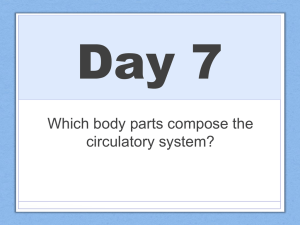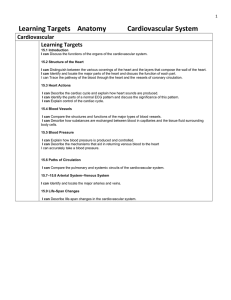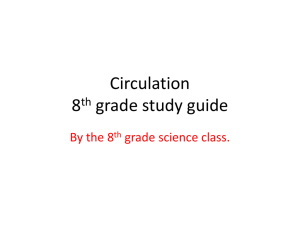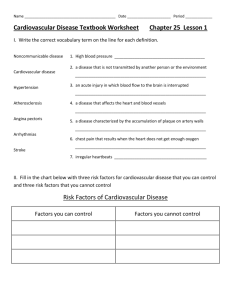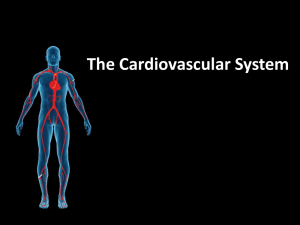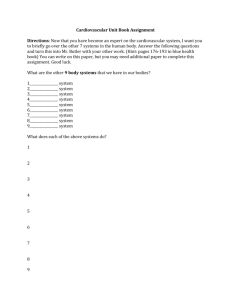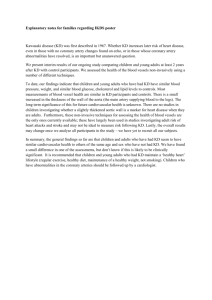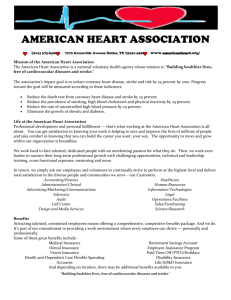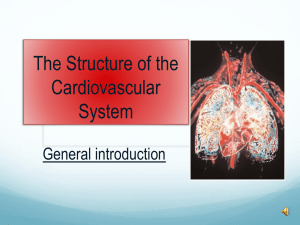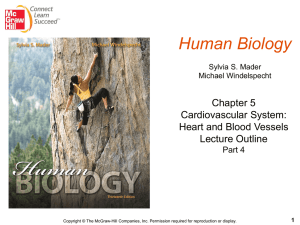L.14.36 Cardiovascular System
advertisement
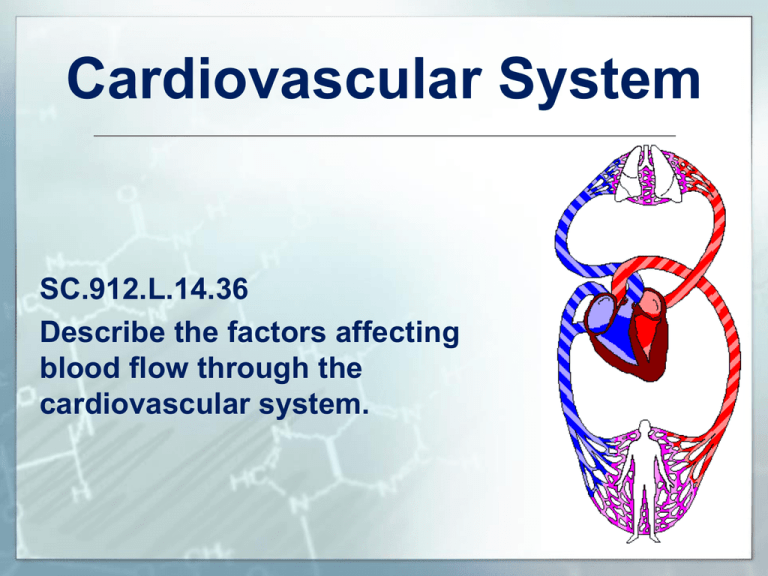
Cardiovascular System SC.912.L.14.36 Describe the factors affecting blood flow through the cardiovascular system. What do I need to know? the factors that affect blood flow through the cardiovascular system: blood pressure, blood volume, resistance, disease, viscosity, and exercise. how these factors affect blood flow The Cardiovascular System The human cardiovascular system is made up of blood vessels, blood, and the heart Together they function to: transport materials remove waste, and distribute waste The Heart The heart is a muscular organ that pumps blood throughout the body. The heart functions as two separate pumps. In systemic circulation the left side of the heart pumps oxygen-rich blood to the rest of the body. In pulmonary circulation the right side pumps oxygen-poor blood from the heart to the lungs. Blood vessels As blood flows through the circulatory system, it moves through three types of blood vessels: 1. Arteries 2. Capillaries 3. Veins Resistance For blood flowing through a vessel, resistance is influenced by 4 parameters: the radius or thickness of the blood vessel the length of the blood vessel the viscosity or thickness of the blood the presence of an obstruction in a vessel If the tube length increases, resistance increases If the viscosity increases, resistance increases If the tube’s radius increases, resistance decreases If there is any obstructions, resistance increases Show What You Know The rate at which blood flows through the human body changes in response to many factors. Which statement describes one of these factors and its effect on blood flow? A. A high viscosity of blood causes an increased resistance in the blood vessels and leads to slow blood flow. B. A low blood pH decreases the rate of diffusion through the blood vessels and leads to slow blood flow. C. The changing of the shape of red blood cells to a crescent shape decreases resistance and lead to a faster blood flow. D. The narrowing of blood vessels increases pressure and leads to a faster blood flow. Show What You Know Which of the following best describes the connection between cardiovascular disease and age? A. As people age, their blood vessels become more elastic leading to less cardiovascular disease. B. As people age, the heart becomes more efficient with each pump, increasing cardiac output. C. As people age, blood pressure decreases leading to more cardiovascular disease. D. As people age, plaque builds up in the arteries increasing vessel resistance, which leads to disease. Show What You Know After a man suffered a stroke, he was unable to use his left arm. What happened inside his body during the stroke that led to his losing the ability to use his left arm? A. A blood clot blocked an artery leading into his left arm during the stroke. B. Aging capillaries in his left arm collapsed and shut down during the stroke. C. A surge of blood into his brain rearranged some neuron connections during the stroke. D. Blood flow to a portion of the right side of his brain was cut off during the stroke. Show What You Know A doctor examines a patient who has high blood pressure and atherosclerosis in the coronary artery. What medical condition connected to blood flow is most likely to affect this patient in the future? A. The patient may develop headaches and confusion due to cancer in the brain caused by years of low levels of oxygen supplied to the brain. B. The patient may develop stiff joints and chest pains from the high blood pressure applied to the muscle and joint tissues of the body. C. The patient may show signs of confusion, weakness, and partial paralysis due to high blood pressure when the plaque dislodges and blocks blood flow to the brain. D. The patient may suffer a heart attack because of the reduction in blood flow to the heart muscles due to severe plaque build-up in the coronary artery.

